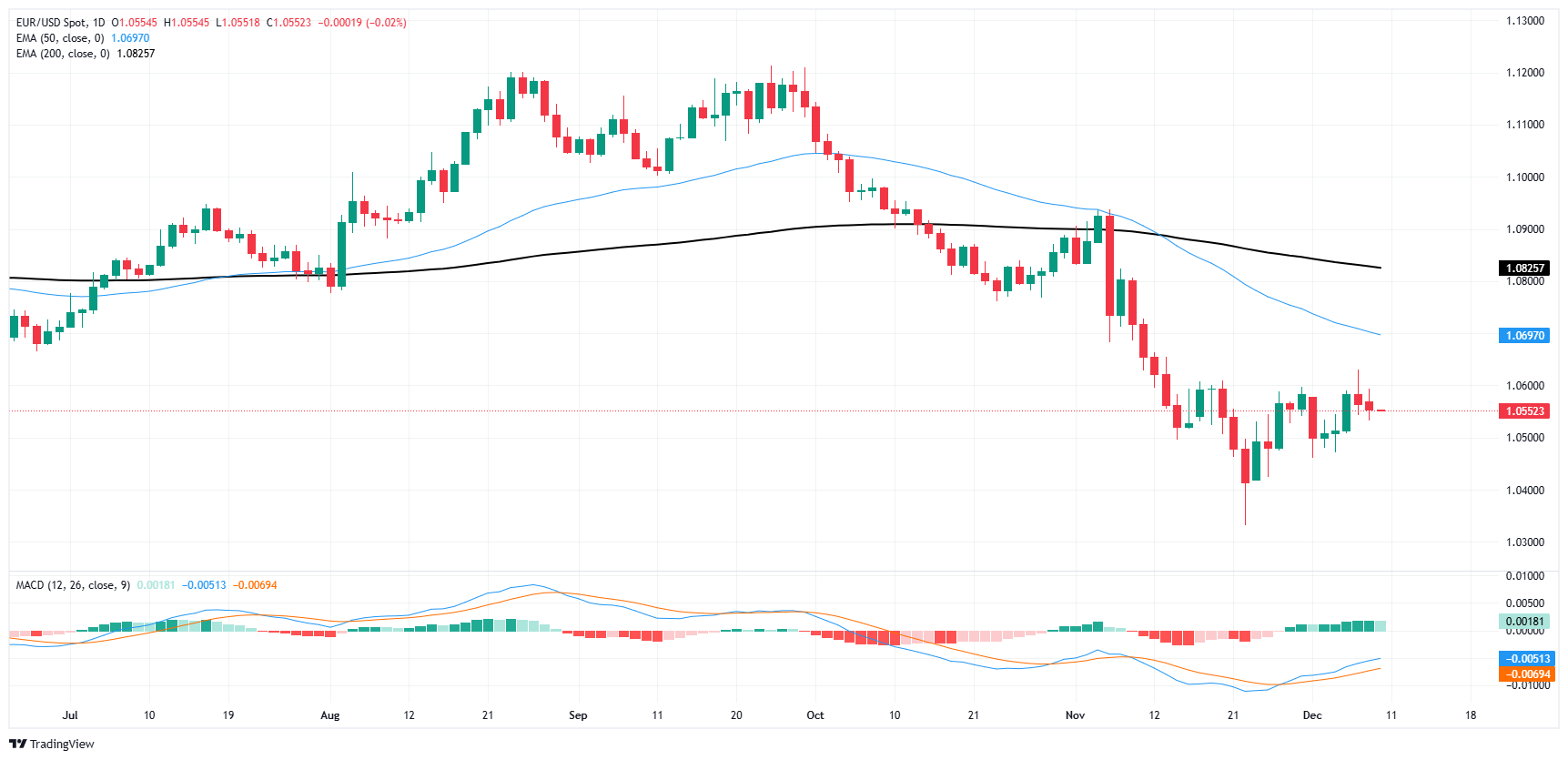EUR/USD slumps as ECB rate call looms ahead
- EUR/USD shed barely a tenth of a percent on Monday.
- Despite limited movement, Fiber eased back from 1.0600.
- US CPI inflation, ECB rate call in the barrel for the mid-week.
EUR/USD trimmed its stance slightly on Monday, easing back away from the 1.0600 handle after facing a technical rejection from the key level last week. Euro traders are buckling down for a long wait to Thursday’s rate call from the European Central Bank (ECB), with Greenback bidders awaiting a fresh round of US Consumer Price Index (CPI) inflation updates due on Wednesday.
The front half of the trading week is a sedate showing for the Euro as ECB rate cut clouds gather in the distance. The pan-EU Sentix Investor Confidence survey for December fell to a 13-month low of -17.5, keeping Euro bulls at bay. The ECB is broadly expected to reduce both its Main Refinancing Operations Rate and Rate on Deposit Facility by 25 bps each on Thursday.
The Federal Reserve (Fed) Bank of New York released its latest summary of consumer survey results during Monday’s American market session, noting that US consumers are riding a tricky line with their economic expectations. According to the NY Fed, US consumers expect a suddenly-improved financial situation for themselves and the federal government, with respondents reporting a sea change in their expectations to afford debt and credit conditions following the re-election of former US President Donald Trump. The same pool of respondents also sharply reduced their expectations for future government borrowing levels.
Further complicating the matter for US consumers, the NY Fed’s survey revealed that the same body of surveyed consumers also raised their expectations of future inflation again, with the average respondent expecting inflation to reaccelerate to 3.0% by next November.
US session traders will be looking ahead to a fresh print of US Consumer Price Index (CPI) inflation slated for Wednesday, with a thin docket on the offering for the early week. US CPI inflation is expected to tick up again on an annualized basis in November. Median market forecasts expect Wednesday’s US CPI inflation to rise to 2.7% YoY compared to October’s 2.6%.
EUR/USD price forecast
The EUR/USD daily chart depicts a bearish medium-term trend as the pair remains firmly below its 50-day EMA at 1.0703 and 200-day EMA at 1.0828. Following the sharp drop in mid-November that led to a multi-month low near 1.0450, the pair has entered a consolidation phase. Resistance at 1.0600–1.0650, which aligns with prior swing lows and the descending 50-day EMA, has capped recent upside attempts. On the downside, 1.0450 stands as a critical support level, guarding against a deeper decline.
The most recent candle reflects indecision, closing near 1.0554 after testing both lower and upper levels within a narrow range. The inability to sustain gains above the 1.0600 psychological level underscores persistent selling pressure. A bearish bias remains intact unless the pair clears the 50-day EMA, which would open the door to retesting the 1.0700 zone. Conversely, a break below the 1.0500 mark could accelerate downside momentum, paving the way for a revisit of the 1.0450 support and potentially lower.
The MACD indicator has started to turn slightly positive, as the histogram trends upward, suggesting that bearish momentum is fading. However, the MACD line remains below the signal line, indicating that the overall trend has yet to shift convincingly. A breakout above 1.0600 with increasing bullish momentum would be a critical development for buyers, while failure to do so keeps the pair vulnerable to further downside, aligning with the broader bearish trend.
EUR/USD daily chart
Euro FAQs
The Euro is the currency for the 20 European Union countries that belong to the Eurozone. It is the second most heavily traded currency in the world behind the US Dollar. In 2022, it accounted for 31% of all foreign exchange transactions, with an average daily turnover of over $2.2 trillion a day, according to data from the Bank of International Settlements. EUR/USD is the most heavily traded currency pair in the world, accounting for an estimated 30% of all transactions, followed by EUR/JPY (4%), EUR/GBP (3%) and EUR/AUD (2%).